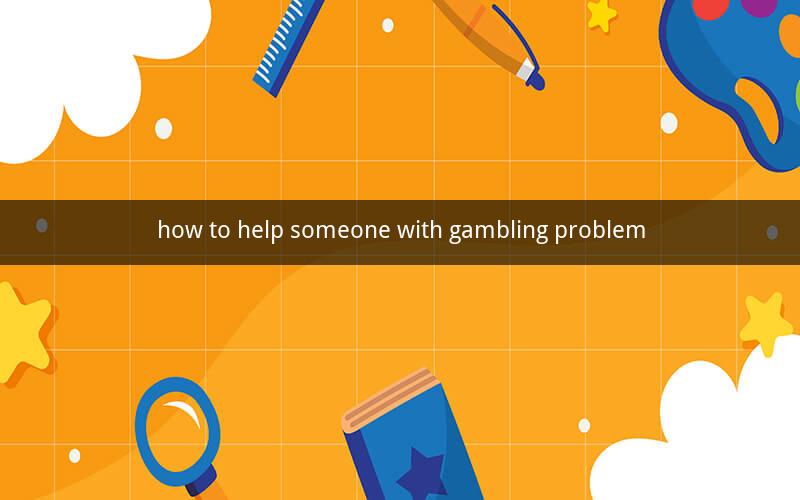
Table of Contents
1. Understanding the Problem
2. Communicating with the Gambler
3. Encouraging Professional Help
4. Supporting the Gambler’s Recovery
5. Setting Boundaries
6. Financial Management
7. Education and Awareness
8. Building a Support Network
9. Legal and Ethical Considerations
10. Monitoring Progress and Adjusting Strategies
1. Understanding the Problem
Gambling addiction is a complex issue that affects both the gambler and their loved ones. It is crucial to understand the nature of the problem before taking any action. Gambling addiction is characterized by an inability to control gambling behavior, despite negative consequences. Recognizing the signs of a gambling problem can help in providing appropriate support.
2. Communicating with the Gambler
Communication is key when helping someone with a gambling problem. It is important to approach the conversation with empathy and understanding. Here are some tips for effective communication:
- Choose a suitable time and place to talk.
- Use "I" statements to express your concerns without placing blame.
- Listen actively and without judgment.
- Avoid confrontational language or arguments.
- Express your love and support for the gambler.
3. Encouraging Professional Help
Seeking professional help is an essential step in overcoming a gambling addiction. Encourage the gambler to consult with a therapist or counselor specializing in addiction. Professional help can provide personalized strategies for recovery and address underlying issues contributing to the addiction.
4. Supporting the Gambler’s Recovery
Supporting the gambler’s recovery involves being patient and understanding. Here are some ways to provide support:
- Encourage the gambler to attend support groups or therapy sessions.
- Offer to accompany them to appointments or meetings.
- Be prepared to help with practical tasks or responsibilities.
- Continue to show your love and support, even during challenging times.
5. Setting Boundaries
Setting boundaries is crucial to protect yourself and the gambler from the negative consequences of gambling. Here are some tips for establishing boundaries:
- Refrain from enabling the gambler’s behavior by providing financial support.
- Avoid placing pressure on the gambler to overcome their addiction quickly.
- Establish clear rules regarding gambling activities in your household or relationship.
6. Financial Management
Financial management is a significant aspect of helping someone with a gambling problem. Here are some strategies for managing finances:
- Create a budget to track income and expenses.
- Consider seeking financial counseling or advice.
- Protect yourself from financial loss by separating your finances from the gambler’s.
7. Education and Awareness
Educating yourself and the gambler about gambling addiction can enhance understanding and support. Here are some resources to consider:
- Read books or articles on gambling addiction.
- Attend workshops or seminars on the topic.
- Share information with friends and family to create a supportive environment.
8. Building a Support Network
Building a support network can provide additional resources and encouragement for both the gambler and their loved ones. Here are some ways to create a support network:
- Reach out to friends, family, or support groups.
- Connect with other individuals who have experienced similar challenges.
- Consider seeking support from organizations specializing in gambling addiction.
9. Legal and Ethical Considerations
Understanding the legal and ethical considerations surrounding gambling addiction is essential. Here are some key points to consider:
- Be aware of the laws and regulations regarding gambling in your area.
- Respect the gambler’s right to privacy and confidentiality.
- Seek guidance from professionals if you are unsure about the legal or ethical implications of your actions.
10. Monitoring Progress and Adjusting Strategies
Monitoring the gambler’s progress and adjusting strategies as needed is crucial for long-term success. Here are some tips for monitoring progress:
- Set realistic goals and track the gambler’s progress towards achieving them.
- Be flexible and willing to make changes to your approach if necessary.
- Celebrate successes and acknowledge setbacks as part of the recovery process.
Frequently Asked Questions
1. How can I help someone who is in denial about their gambling addiction?
Encourage them to seek professional help and express your willingness to support them through the process.
2. What if the gambler refuses to stop gambling?
Establish boundaries and seek support from others who have experienced similar challenges.
3. How can I support my loved one during their recovery journey?
Be patient, understanding, and offer your love and support throughout the process.
4. What are some signs of a gambling addiction?
Signs include secretive behavior, financial problems, neglecting responsibilities, and lying about gambling activities.
5. How can I protect myself from the negative consequences of gambling?
Set clear boundaries, separate finances, and seek support from others.
6. What is the role of therapy in gambling addiction recovery?
Therapy can help the gambler understand the underlying causes of their addiction and develop strategies for overcoming it.
7. Can a gambling addiction be cured?
While there is no guaranteed cure, recovery is possible with proper treatment and support.
8. How can I encourage my loved one to seek professional help?
Express your concerns, offer your support, and suggest they consult with a therapist or counselor specializing in addiction.
9. What resources are available for individuals struggling with gambling addiction?
Support groups, therapy services, financial counseling, and educational resources are available to help individuals overcome their addiction.
10. How can I maintain a healthy relationship with someone who has a gambling addiction?
Be patient, supportive, and communicate openly about your concerns and needs.